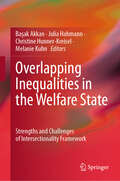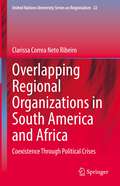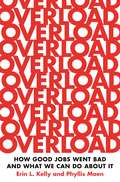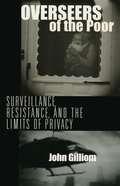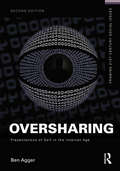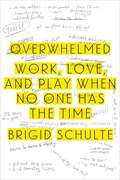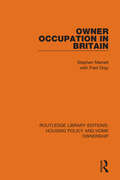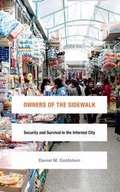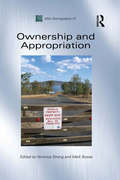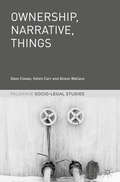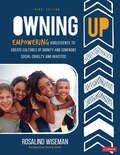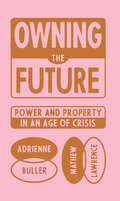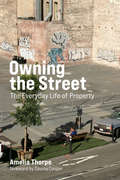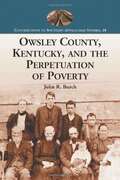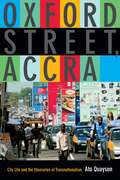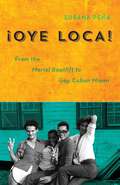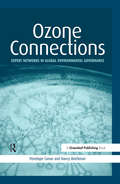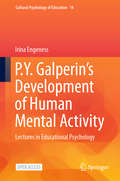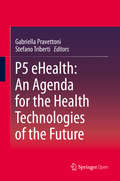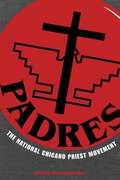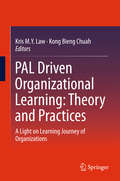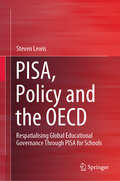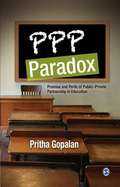- Table View
- List View
Overlapping Inequalities in the Welfare State: Strengths and Challenges of Intersectionality Framework
by Christine Hunner-Kreisel Melanie Kuhn Julia Hahmann Başak AkkanThe volume stresses the relevance of the intersectionality framework in welfare state analysis by examining overlapping inequalities within the shifting institutional boundaries and organisational processes across diverse welfare settings. The volume explores the strengths and challenges of theoretical and methodological approaches to intersectionality, addressing its spatial, temporal and comparative dimensions. It, therefore, adopts a critical and process-focused approach while recognising the agency of individuals as subjects of state policies. The contributions critically build the link between intersectionality and other theoretical frameworks and research paradigms, including Marxist social reproduction theory, critical race studies, Bourdieuan analysis of class, critical geography, childhood, queer, migration, and disability studies. The contributions provide insights into the institutional realms of health, education, social services, and care work and examine state practices of racial profiling and policing in distinct welfare states. Overall, the contributions illustrate the strengths of the intersectionality framework in empirical inquiries while providing critical reflections on its limitations. Readers across a diverse array of social science disciplines will find this book valuable.
Overlapping Regional Organizations in South America and Africa: Coexistence Through Political Crises (United Nations University Series on Regionalism #22)
by Clarissa Correa RibeiroThis book discusses the interaction between and the impact of overlapping actions by regional organizations while dealing with critical events. It compares all the sub-regions in South America and Africa from this perspective and creates new knowledge through cross-regional gleanings. The book analyses types of institutional interaction among regional organizations and the effects of overlapping actions on the coexistence or fracturing of regional processes. It examines and compares the dynamics of these interactions in both South America and Africa. The book contributes to the study of comparative regionalism by providing generalization and institutional learning based on a cross-regional approach. It gives to students, researchers and interested readers an understanding of the complexity of regional affairs in multi-organizational environments.
Overload: How Good Jobs Went Bad and What We Can Do about It
by Erin L. Kelly Phyllis MoenWhy too much work and too little time is hurting workers and companies—and how a proven workplace redesign can benefit employees and the bottom lineToday's ways of working are not working—even for professionals in "good" jobs. Responding to global competition and pressure from financial markets, companies are asking employees to do more with less, even as new technologies normalize 24/7 job expectations. In Overload, Erin Kelly and Phyllis Moen document how this new intensification of work creates chronic stress, leading to burnout, attrition, and underperformance. "Flexible" work policies and corporate lip service about "work-life balance" don't come close to fixing the problem. But this unhealthy and unsustainable situation can be changed—and Overload shows how.Drawing on five years of research, including hundreds of interviews with employees and managers, Kelly and Moen tell the story of a major experiment that they helped design and implement at a Fortune 500 firm. The company adopted creative and practical work redesigns that gave workers more control over how and where they worked and encouraged managers to evaluate performance in new ways. The result? Employees' health, well-being, and ability to manage their personal and work lives improved, while the company benefited from higher job satisfaction and lower turnover. And, as Kelly and Moen show, such changes can—and should—be made on a wide scale.Complete with advice about ways that employees, managers, and corporate leaders can begin to question and fix one of today's most serious workplace problems, Overload is an inspiring account about how rethinking and redesigning work could transform our lives and companies.
Overload: How Good Jobs Went Bad and What We Can Do about It
by Erin L. Kelly Phyllis MoenWhy too much work and too little time is hurting workers and companies—and how a proven workplace redesign can benefit employees and the bottom lineToday's ways of working are not working—even for professionals in "good" jobs. Responding to global competition and pressure from financial markets, companies are asking employees to do more with less, even as new technologies normalize 24/7 job expectations. In Overload, Erin Kelly and Phyllis Moen document how this new intensification of work creates chronic stress, leading to burnout, attrition, and underperformance. "Flexible" work policies and corporate lip service about "work-life balance" don't come close to fixing the problem. But this unhealthy and unsustainable situation can be changed—and Overload shows how.Drawing on five years of research, including hundreds of interviews with employees and managers, Kelly and Moen tell the story of a major experiment that they helped design and implement at a Fortune 500 firm. The company adopted creative and practical work redesigns that gave workers more control over how and where they worked and encouraged managers to evaluate performance in new ways. The result? Employees' health, well-being, and ability to manage their personal and work lives improved, while the company benefited from higher job satisfaction and lower turnover. And, as Kelly and Moen show, such changes can—and should—be made on a wide scale.Complete with advice about ways that employees, managers, and corporate leaders can begin to question and fix one of today's most serious workplace problems, Overload is an inspiring account about how rethinking and redesigning work could transform our lives and companies.
Overseers of the Poor: Surveillance, Resistance, and the Limits of Privacy
by John GilliomIn Overseers of the Poor, John Gilliom confronts the everyday politics of surveillance by exploring the worlds and words of those who know it best-the watched. Arguing that the current public conversation about surveillance and privacy rights is rife with political and conceptual failings, Gilliom goes beyond the critics and analysts to add fresh voices, insights, and perspectives.
Oversharing: Presentations of Self in the Internet Age (Framing 21st Century Social Issues)
by Ben AggerPeople ‘overshare’ when they interact with others through the screens of computers and smartphones. Oversharing means to divulge more of their inner feelings, opinions and sexuality than they would in person, or even over the phone. Text messaging, Facebooking, tweeting, camming, blogging, online dating, and internet porn are vehicles of this oversharing, which blurs the boundary between public and private life. This book examines these ‘presentations of self’, acknowledging that we are now much more public about what used to be private. With this second edition, Agger adds a new chapter on whether privacy is possible that addresses selfies, job loss due to oversharing, the surveillance state, and examples of when the private should go public.
Overwhelmed: Work, Love, and Play When No One Has the Time
by Brigid SchulteAccording to the Leisure Studies Department at the University of Iowa, true leisure is “that place in which we realize our humanity.” If that’s true, argues Brigid Schulte, then we're doing dangerously little realizing of our humanity. In Overwhelmed, Schulte, a staff writer for The Washington Post, asks: Are our brains, our partners, our culture, and our bosses making it impossible for us to experience anything but “contaminated time”?<P> Schulte first asked this question in a 2010 feature for The Washington Post Magazine: “How did researchers compile this statistic that said we were rolling in leisure—over four hours a day? Did any of us feel that we actually had downtime? Was there anything useful in their research—anything we could do?”<P> Overwhelmed is a map of the stresses that have ripped our leisure to shreds, and a look at how to put the pieces back together. Schulte speaks to neuroscientists, sociologists, and hundreds of working parents to tease out the factors contributing to our collective sense of being overwhelmed, seeking insights, answers, and inspiration. She investigates progressive offices trying to invent a new kind of workplace; she travels across Europe to get a sense of how other countries accommodate working parents; she finds younger couples who claim to have figured out an ideal division of chores, childcare, and meaningful paid work. Overwhelmed is the story of what she found out.
Owner-Occupation in Britain
by Stephen MerrettOriginally published in 1982, this is a companion volume to State Housing in Britain. Together the 2 volumes cover the tenure of some 85% of all British households in much of the 20th Century. The development of the tenure between 1918 and 1970 with special reference to its position in state housing policies is examined. Subsequent chapters analyse effective demand since 1970, both with respect to its demographic base and as regards the capacity to buy. In particular the question of why people want to buy is asked and the supply of housing (both council houses and former private rented accommodation) as well as the output of speculative housebuilders is considered. A detailed survey of the perturbations in the housing market during the volatile experience of the British economy since 1970 is also covered.
Owners of the Sidewalk: Security and Survival in the Informal City
by Daniel M. GoldsteinMany of Bolivia's poorest and most vulnerable citizens work as vendors in the Cancha mega-market in the city of Cochabamba, where they must navigate systems of informality and illegality in order to survive. In Owners of the Sidewalk Daniel M. Goldstein examines the ways these systems correlate in the marginal spaces of the Latin American city. Collaborating with the Cancha's legal and permanent stall vendors (fijos) and its illegal and itinerant street and sidewalk vendors (ambulantes), Goldstein shows how the state's deliberate neglect and criminalization of the Cancha's poor--a practice common to neoliberal modern cities--makes the poor exploitable, governable, and consigns them to an insecure existence. Goldstein's collaborative and engaged approach to ethnographic field research also opens up critical questions about what ethical scholarship entails.
Ownership and Appropriation (ASA Monographs #7)
by Veronica StrangIn a world of finite resources, expanding populations and widening structural inequalities, the ownership of things is increasingly contested. Not only are the commons being rapidly enclosed and privatized, but the very idea of what can be owned is expanding, generating conflicts over the ownership of resources, ideas, culture, people, and even parts of people. Understanding processes of ownership and appropriation is not only central to anthropological theorizing but also has major practical applications, for policy, legislative development and conflict resolution.Ownership and Appropriation significantly extends anthropology's long-term concern with property by focusing on everyday notions and acts of owning and appropriating. The chapters document the relationship between ownership, subjectivities and personhood; they demonstrate the critical consequences of materiality and immateriality on what is owned; and they examine the social relations of property. By approaching ownership as social communication and negotiation, the text points to a more dynamic and processual understanding of property, ownership and appropriation.
Ownership, Narrative, Things (Palgrave Socio-Legal Studies)
by Helen Carr Dave Cowan Alison WallaceThis book uses a case study of a low-cost home ownership initiative at the margins of renting and owning provided by social landlords – known as shared ownership – to challenge everyday assumptions held about the ‘social’ and the ‘legal’ in property. The authors provide a study of the construction of property ownership, from the creation of this idea through to the present day, and offer a fresh consideration of key issues surrounding property, ownership, and the social.Analysing a diverse range of sources (from archives to micro-blogs, observation of housing providers, and interviews with shared owners), the authors explain the significance of the things (from the formal documents like leases, to odd materials like sweet wrappers and cigarette butts) commonly found in the narratives around shared ownership which are used to construct it as private ownership in everyday life. Ultimately, they uncover how this dream of ownership can become tarnished when people’s identities as ‘owners’ come under threat, and as such, these findings will provide fascinating insight into the intricacies of so-called home ownership for scholars of Law, Criminology, and Sociology.
Owning Up: Empowering Adolescents to Create Cultures of Dignity and Confront Social Cruelty and Injustice
by Rosalind WisemanFoster dignity and respect and combat youth aggression As middle school students adjust to tougher academics, they also find themselves introduced to increasingly complex social situations—including conflicts on social media, racism, anxiety, and bullying—and the choices they make can have repercussions far beyond the classroom. But they are not alone. This new edition from bestselling author and Cultures of Dignity co-founder Rosalind Wiseman is packed with the latest research-based strategies, reviewed by high school and middle school students and revised to include all that she has learned while working over decades with young people. Owning Up has helped teachers, counselors, and leaders give students the tools they need to own up and take responsibility—as perpetrators, bystanders, and targets—for unethical behavior and to treat themselves and others with dignity. This bigger, comprehensive edition features: · Three flexible, dynamic curricula separated by grade · A new chapter on successfully implementing a social and emotional learning program in every school · More games, role-playing activities, and provocative discussion questions to use in co-ed or single-sex groups · Even more lessons and resources, updated to address social media, bystanding, and how young people can develop strong, healthy relationships with adults Designed for use both in school and out, Owning Up helps prevent many of the common issues young people face and promotes friendships in these critical years. As educators, we must enlist the people who can make a real difference: the students.
Owning Up: Empowering Adolescents to Create Cultures of Dignity and Confront Social Cruelty and Injustice
by Rosalind WisemanFoster dignity and respect and combat youth aggression As middle school students adjust to tougher academics, they also find themselves introduced to increasingly complex social situations—including conflicts on social media, racism, anxiety, and bullying—and the choices they make can have repercussions far beyond the classroom. But they are not alone. This new edition from bestselling author and Cultures of Dignity co-founder Rosalind Wiseman is packed with the latest research-based strategies, reviewed by high school and middle school students and revised to include all that she has learned while working over decades with young people. Owning Up has helped teachers, counselors, and leaders give students the tools they need to own up and take responsibility—as perpetrators, bystanders, and targets—for unethical behavior and to treat themselves and others with dignity. This bigger, comprehensive edition features: · Three flexible, dynamic curricula separated by grade · A new chapter on successfully implementing a social and emotional learning program in every school · More games, role-playing activities, and provocative discussion questions to use in co-ed or single-sex groups · Even more lessons and resources, updated to address social media, bystanding, and how young people can develop strong, healthy relationships with adults Designed for use both in school and out, Owning Up helps prevent many of the common issues young people face and promotes friendships in these critical years. As educators, we must enlist the people who can make a real difference: the students.
Owning the Future: Power and Property in an Age of Crisis
by Mathew Lawrence Adrienne BullerA radical manifesto for the transformation of post-pandemic politicsThe question of ownership is the critical fault line of our times. During the pandemic this issue has only become more divisive. Since March 2020 we have witnessed the extraordinary growth of asset manager capitalism and the explosive concentration of wealth within the hands of the already super-rich. This new oligarchy controls every part of our social and economics lives.In the face of crisis, the authors warn that mere redistribution within current forms of ownership is not enough; our goal must be to go beyond the limits of the current system, dominated by private enclosure and unequal ownership. Only by reimagining how our economy is owned and by whom can we address the crises of our time - from the fallout of the pandemic to ecological collapse - at their roots.Building from this insight, the authors argue the systemic change we need hinges on a new era of democratic ownership: a reinvention of the firm as a vehicle for collective endeavour and meeting social needs. Against the new oligarchy of the platform giants, a digital commons that uses our data for collective good, not private profit. In place of environmental devastation, a new agenda of decommodification - of both nature and needs - with a Green New Deal and collective stewardship of the planet&’s natural wealth. Together, these proposals offer a road map to owning the future, and building a better world.
Owning the Street: The Everyday Life of Property (Urban and Industrial Environments)
by Amelia ThorpeHow local, specific, and personal understandings about belonging, ownership, and agency intersect with law to shape the city.In Owning the Street, Amelia Thorpe examines everyday experiences of and feelings about property and belonging in contemporary cities. She grounds her account in an empirical study of PARK(ing) Day, an annual event that reclaims street space from cars. A popular and highly recognizable example of DIY Urbanism, PARK(ing) Day has attracted considerable media attention, but has not yet been the subject of close scholarly examination. Focusing on the event's trajectories in San Francisco, Sydney, and Montreal, Thorpe addresses this gap, making use of extensive interview data, field work, and careful reflection to explore these tiny, temporary, and often transformative interventions. PARK(ing) Day is based on a creative interpretation of the property producible by paying a parking meter. Paying a meter, the event&’s organizers explained, amounts to taking out a lease on the space; while most &“lessees&” use that property to store a car, the space could be put to other uses—engaging politics (a free health clinic for migrant workers, a same sex wedding, a protest against fossil fuels) and play (a dance floor, giant Jenga, a pocket park). Through this novel rereading of everyday regulation, PARK(ing) Day provides an example of the connection between belief and action—a connection at the heart of Thorpe&’s argument. Thorpe examines ways in which local, personal, and materially grounded understandings about belonging, ownership, and agency intersect with law to shape the city. Her analysis offers insights into the ways in which citizens can shape the governance of urban space, particularly in contested environments. The book's foreword is by Davina Cooper, Research Professor in Law at King&’s College London.
Owsley County, Kentucky, And The Perpetuation Of Poverty (Contributions To Southern Appalachian Studies #18)
by John R. BurchOwsley County, Kentucky, is well known by journalists, academics, and local historians as a quintessential example of rural poverty in Appalachia. This study identifies several reasons behind Owsley County's ongoing struggle with poverty, including the county's lack of natural resources, a poor transportation system, and a centralized socio-political power structure controlled by the entrenched elite. The author asserts that Owsley County's economic hardships are far from unique, but rather are representative of a significant number of Appalachian counties and towns. Several tables and appendices provide useful demographic, legislative, and agricultural data.
Oxford Street, Accra: City Life and the Itineraries of Transnationalism
by Ato QuaysonIn Oxford Street, Accra, Ato Quayson analyzes the dynamics of Ghana's capital city through a focus on Oxford Street, part of Accra's most vibrant and globalized commercial district. He traces the city's evolution from its settlement in the mid-seventeenth century to the present day. He combines his impressions of the sights, sounds, interactions, and distribution of space with broader dynamics, including the histories of colonial and postcolonial town planning and the marks of transnationalism evident in Accra's salsa scene, gym culture, and commercial billboards. Quayson finds that the various planning systems that have shaped the city--and had their stratifying effects intensified by the IMF-mandated structural adjustment programs of the late 1980s--prepared the way for the early-1990s transformation of a largely residential neighborhood into a kinetic shopping district. With an intense commercialism overlying, or coexisting with, stark economic inequalities, Oxford Street is a microcosm of historical and urban processes that have made Accra the variegated and contradictory metropolis that it is today.
Oye Loca: From the Mariel Boatlift to Gay Cuban Miami
by Susana PeñaDuring only a few months in 1980, 125,000 Cubans entered the United States as part of a massive migration known as the Mariel boatlift. The images of boats of all sizes, in various conditions, filled with Cubans of all colors and ages, triggered a media storm. Fleeing Cuba&’s repressive government, many homosexual men and women arrived in the United States only to face further obstacles. Deemed &“undesirables&” by the U.S. media, the Cuban state, and Cuban Americans already living in Miami, these new entrants marked a turning point in Miami&’s Cuban American and gay histories. In Oye Loca, Susana Peña investigates a moment of cultural collision. Drawing from first-person stories of Cuban Americans as well as government documents and cultural texts from both the United States and Cuba, Peña reveals how these discussions both sensationalized and silenced the gay presence, giving way to a Cuban American gay culture. Through an examination of the diverse lives of Cuban and Cuban American gay men, we learn that Miami&’s gay culture was far from homogeneous. By way of in-depth interviews, participant observation, and archival analysis, Peña shows that the men who crowded into small apartments together, bleached their hair with peroxide, wore housedresses in the street, and endured ruthless insults challenged what it meant to be Cuban in Miami. Making a critical incision through the study of heteronormativity, homosexualities, and racialization, ultimately Oye Loca illustrates how a single historical event helped shape the formation of an entire ethnic and sexual landscape.
Ozone Connections: Expert Networks in Global Environmental Governance
by Penelope Canan Nancy ReichmanIt is difficult to think of a more significant example of international cooperation to address a problem that threatened the health and wellbeing of the entire planet than the 1987 Montreal Protocol for the Elimination of Ozone-Depleting Substances. This breakthrough in international environmental governance has proved to be an extraordinary success beyond rhetoric or promises. In a dozen years, this international agreement went from an understanding of the need to act in a precautionary manner for mutual benefit to a successful worldwide effort to eliminate chemical substances harmful to our protective ozone layer. The production and consumption of most ozone-depleting substances has now been phased out in developed countries, with developing countries not far behind. What happened and why is of tremendous importance for those looking for guidance in the future, particularly those now involved in hugely complicated negotiations on climate change. The success of the Montreal Protocol has been linked to many factors such as political will, treaty flexibility and the recognition of equity issues raised by developing countries. While comprehensively analysing all of these success factors, Ozone Connections goes on to suggest that a social organization of global governance as typified by the protocol's Technical and Economic Assessment Panel (TEAP) was a unique – but replicable – decisive factor. The book argues that we need to understand how the implementation of complex global environmental agreements depends on the construction and exploitation of social connections among experts who act collectively to define solutions to environmental problems. This highly original and provoking thesis synthesises some of the more exciting social science concepts and methods, while refining our basic understanding of environmental social change and providing policy-makers with concrete success factors to replicate. This book will be essential reading for academics in the fields of sociology, political science, international relations, network studies, human communication, motivation, collaboration and leadership, as well as the burgeoning interdisciplinary field of environmental studies. Businesses will also find many applications for practical use. Finally, the many directly transferable lessons from ozone layer protection make this book a key addition to the growing literature on climate change.
P.Y. Galperin's Development of Human Mental Activity: Lectures in Educational Psychology (Cultural Psychology of Education #14)
by Irina EngenessThis open access book introduces the legacy of Piotr Galperin to a wider audience of researchers, educators and psychologists. Previous translations of Galperin’s work present only some aspects of his conceptual thinking; however, his main contribution to the general, genetic and pedagogical psychology as a unique holistic and systemic approach to studying of psychological phenomena and processes, mechanisms of their formation and development, is still quite unknown in most parts of the world.The eight lectures chosen for the book have been translated from Russian for the first time, and they belong to the Study of the Formation of Human Mental Activity from Galperin’s collection of the Lectures in Psychology (Galperin, 2002). These eight lectures present the central ideas of Galperin’s pedagogical theory, and they conceptualise learning to learn approach and argue how teaching and learning process can enhance the development of higher mental functions with learners and therefore enhance the development of students as learners. These ideas may be of primary importance to educational practitioners and researchers interested in developmental learning and teaching approach given the current concerns of educational practice that schools struggle to prepare students for their adult and the need to develop the capacity in lifelong learning with students in the 21st century.
P5 eHealth: An Agenda for the Health Technologies of the Future
by Gabriella Pravettoni Stefano TribertiThis open access volume focuses on the development of a P5 eHealth, or better, a methodological resource for developing the health technologies of the future, based on patients’ personal characteristics and needs as the fundamental guidelines for design. It provides practical guidelines and evidence based examples on how to design, implement, use and elevate new technologies for healthcare to support the management of incurable, chronic conditions. The volume further discusses the criticalities of eHealth, why it is difficult to employ eHealth from an organizational point of view or why patients do not always accept the technology, and how eHealth interventions can be improved in the future. By dealing with the state-of-the-art in eHealth technologies, this volume is of great interest to researchers in the field of physical and mental healthcare, psychologists, stakeholders and policymakers as well as technology developers working in the healthcare sector.
PADRES: The National Chicano Priest Movement
by Richard Edward MartínezFrom the 1848 Treaty of Guadalupe Hidalgo to the 1960s, Mexican American Catholics experienced racism and discrimination within the U.S. Catholic church, as white priests and bishops maintained a racial divide in all areas of the church's ministry. <P><P>To oppose this religious apartheid and challenge the church to minister fairly to all of its faithful, a group of Chicano priests formed PADRES (Padres Asociados para Derechos Religiosos, Educativos y Sociales, or Priests Associated for Religious, Educational, and Social Rights) in 1969. Over the next twenty years of its existence, PADRES became a powerful force for change within the Catholic church and for social justice within American society.
PAL Driven Organizational Learning: Theory and Practices
by Kris M. Y. Law Kong Bieng ChuahPresenting an innovative concept and approach for organization management, this book serves to document an organization's journey towards the ultimate goal of learning organization. This book also shares the experience on how a OL framework built on established learning theories, could be used effectively, overcoming many of the barriers in a real industrial setting. Utilizing a ready-to-use tool called Project Action Learning (PAL) to analyze real life case studies, the authors introduce a framework that allows teams of people to work and learn over the course of business projects. Equal emphasis is placed on the achievement of pre-set project outcomes and the learning objectives of the participants. In addition, a long term organizational learning strategy is put forward and the necessary supporting infrastructure, in the form of four 'PAL Pillars', is described. The concepts and development of the PAL driven Organizational Learning model are inspired by and grounded in, Western and Eastern business philosophies and case studies which offer important insights into the management of organizations who are keen to develop sustainable business practices.
PISA, Policy and the OECD: Respatialising Global Educational Governance Through PISA for Schools
by Steven LewisThis book explores new modes, spaces and relations of the Organisation for Economic Cooperation and Development (OECD)'s global educational governance associated with the PISA for Schools test. Adopting a theoretically-rich policy sociology approach, with an emphasis on topological understandings of spatiality and power, the book examines the entire PISA for Schools policy cycle, from its initial development, to its administration and promotion in the U.S., and its local enactment by schools and teachers. It demonstrates how PISA for Schools helps to steer how schooling is locally understood and practised through separate and yet overlapping techniques: governing by (1) heterarchy, (2) respatialisation and (3) 'best practice'.The book reveals the specific effects of PISA for Schools as an exemplar of how global educational governance is increasingly enfolded within contemporary schooling, as well as discussing how we might practise a policy sociology in which the local is acknowledged as a relevant space of concern.
PPP Paradox
by Pritha GopalanPublic-private partnerships have been in use for a long time, and in many countries, to build roads and bridges, clean rivers, and manage waste. In the last two decades, they have slowly begun to make their presence felt in the field of public education. Several countries, including the United States and India, have recently enacted laws that include partnerships with private entities as a vehicle for education reform. PPP Paradox discusses a swathe of PPPs in education and assesses their approach and contribution to genuine school change. This broad and even-handed survey of a variety of policy positions is followed by specific accounts of reform efforts in two case studies--one from a partnership in middle-school change in curriculum and instruction that took place in the state of Michigan in the United States, and the other from a partnership to bring Montessori education to government-run schools in Chennai, a large Indian city.
